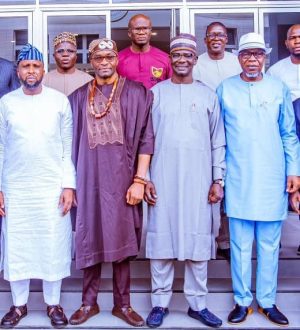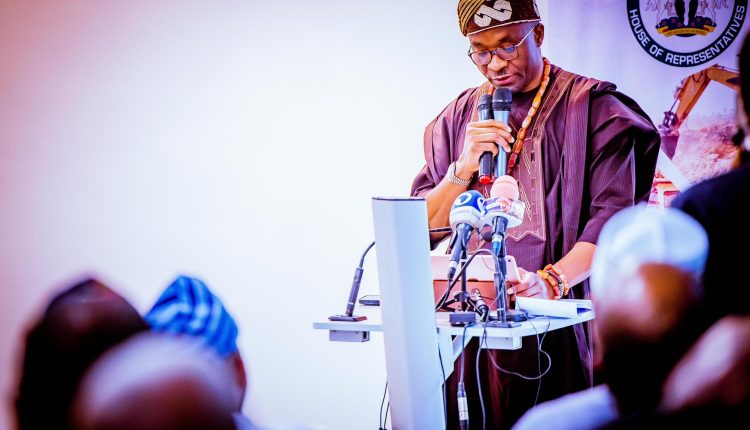The Deputy Speaker of the House of Representatives, Hon. Benjamin Okezie Kalu, says insecurity, inadequate infrastructure, and a lack of skilled labour have continued to act as bottlenecks hampering the growth of Nigeria’s mining sector.
He asserted this while delivering his address at a public policy dialogue on Nigeria’s mineral and mining legislation in Abuja.
He said that the nation’s vast mineral resources have remained largely untapped and undeservedly overshadowed by our too-great reliance on oil.
Kalu also said that despite boasting over forty commercially viable minerals, the mining sector contributes a mere 0.3% to the country’s GDP, saying it is unacceptable.
Referring to a bill he co-sponsored with the Chairman, House of Representatives Committee on Solid Minerals, Hon. Jonathan Gbefwi, titled the Nigerian Minerals and Mining Act (Amendment) Bill, as well as eight other mining bills, Kalu said that the bills, when passed into law, will represent a turning point for the nation’s mineral wealth.
The Deputy Speaker also noted that governments hold many of the levers to deal with the great challenges, adding, however, that businesses have the innovation, technology, and talents to deliver the needed solutions.
Kalu also opined that the governing philosophy in the mining sector in Nigeria should henceforth be approached with a private-sector-led lens, stressing that it is through this crucial partnership that the true potential of Nigeria’s mining sector can be unlocked.

He said: “This public policy dialogue is engineered to create the appropriate right of way for the necessary adjustments and policy-making creativity that are required to optimise the promising prospects of Nigeria’s mining sector. Today, I stand before you not only as Deputy Speaker of the House of Representatives but also as a co-sponsor of the HB.751: Nigerian Minerals and Mining Act (Amendment) Bill so ably sponsored by Hon. Jonathan Gbefwi. This legislation, if passed, will represent a turning point for our nation’s mineral wealth.
“There are indications of a renewed vigour in our mining industry, fuelled by a collective will to diversify our economy, create jobs, and unlock the immense potential that lies beneath our soil. The 2016–2025 mining industry development roadmap, aiming to increase the sector’s GDP contribution to 3% by 2025, is already showing progress. Projects like the Segilola Gold Project in Osun State, governed by a private-sector-led lens, are injecting millions of dollars into our economy and attracting much-needed investment.
“To demonstrate this concisely, in the 3rd quarter of 2023, the Segilola Gold mine in Osun State, Nigeria’s first industrial-scale gold mine, posted $118 million in revenue for its owners, Thor Explorations Limited, after reporting $71.7 million in earnings before interest, taxes, depreciation, and amortisation (EBITDA) in 2022, according to its publicly available financial statements for 2022 and 2023. Initiatives like the simplification of licencing and competitive royalty regimes attract global players like Thor Explorations, showcasing the potential for an industrial-scale mining sector. However, challenges remain. Insecurity, inadequate infrastructure, and a lack of skilled labour continue to act as bottlenecks. This is where HB 751 and eight other mining-related bills currently under consideration come in.
“They are not just amendments; they are a comprehensive reform package designed to address these challenges and propel our mining sector into the future. Here’s what these bills aim to achieve: Enhanced security: By fostering collaboration between mining companies, communities, and security agencies, we can create a safer environment for investment and development. Infrastructure development: We are committed to investing in critical infrastructure like roads, railways, and power, making mine operations more efficient and cost-effective. Skilled workforce development: We are building partnerships with educational institutions and industry leaders to equip Nigerians with the skills they need to thrive in this sector. Streamlined regulation: The new legislation will simplify bureaucratic processes, reduce red tape, and create a more transparent and predictable regulatory environment.
I urge all stakeholders—government, businesses, communities, and civil society—to join hands and work together to make this vision a reality. Let us leverage the power of partnerships, innovation, and technology to unlock the true potential of our mineral wealth. The time for action is now.”
The Governor of Nasarawa State in northcentral Nigeria, Mr Abdullahi Sule, said that solid minerals are bigger than oil in Nigeria, but he does not focus on them.
He noted that solid minerals can comfortably sustain the country.
He called on the government to increase compensation to states with mineral resources.
“If we are serious about Nigeria, we must reform the solid mineral sector,“ he said.
On his part, the Chairman of, the House of Representatives Committee on Solid Minerals, Hon. Jonathan Gbefwi, said that the dialogue is aimed at addressing key priority areas in the solid mineral sector.
He noted that the lack of synergy between the state and federal governments has led to double taxation in the solid mineral sector.
The dialogue brought together stakeholders in the solid mineral sector to chat about a way forward.


Comments are closed.